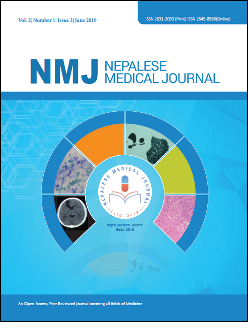Clinical Outcome of Intravenous Immunoglobulin in the treatment of Guillain Barre Syndrome in a Nepalese Tertiary Centre
DOI:
https://doi.org/10.3126/nmj.v2i1.24000Keywords:
Axonal, Dennyelinating, Guillain Barre Syndrome, Immunoglobulin, NeuropathyAbstract
Introduction: Intravenous Immunoglobulin is an approved therapy for Guillain Barre Syndrome. Our objective is to understand the management and outcome in Guillain Barre Syndrome patients treated with Immunoglobulin.
Materials and Methods: All consecutive patients were retrospectively evaluated in the study were of age ≥16 years and were being admitted in the department of Neurology of Tribhuvan University Teaching Hospital, Kathmandu, Nepal from 2016 March to 2017 February.
Results: A total of 46 patients were included, mean age= 36.5±16.2 years, range = 16years to 80 years. Thirty-two patients (70%) were axonal variant, acute motor axonal neuropathy is more common (18 patients). Intravenous immunoglobulin was used in 23 patients (50%), 17 of them were axonal variant and 6 were demyelinating. Guillain Barre Syndrome patients with bilateral facial weakness (70% vs 30%; p<0.05) were likely to receive immunoglobulin therapy. Patients with immunoglobulin were found to have higher ODSS at Nadir (9.3±1.8 vs 6.9±1.9; p <0.001) and discharge than patients without immunoglobulin treatment (6.2±1.7 vs 5.0±1.6; p=0.001). At Nadir, Patients with immunoglobulin were found to have higher Guillain Barre Syndrome disability score (4.1±0.7 vs 3.2±0.9; p<0.095). In immunoglobulin group, Axonal variants were found to have
higher ODSS score (9.6±1.9 vs 8.2±0.9, p=0.027) and Guillain Barre Syndrome disability score (4.2±0.7 vs 3.5±0.5; p=0.019) at nadir than demyelinating group.
Conclusions: Intravenous Immunoglobulin is easier to administer and is safe with fewer adverse effects. Although expensive, it is an effective treatment option in a resource-limited center. Axonal variants are clinically severe and likely to be need of Intravenous Immunoglobulin therapy.
Downloads
Downloads
Published
How to Cite
Issue
Section
License
This license enables reusers to distribute, remix, adapt, and build upon the material in any medium or format, so long as attribution is given to the creator. The license allows for commercial use.
Copyright on any article published by Nepalese Medical Journal is retained by the author(s).
Authors grant Nepalese Medical Journal a license to publish the article and identify itself as the original publisher.
Authors also grant any third party the right to use the article freely as long as its integrity is maintained and its original authors, citation details and publisher are identified.




